|
|
|
Sort Order |
|
|
|
Items / Page
|
|
|
|
|
|
|
| Srl | Item |
| 1 |
ID:
105308
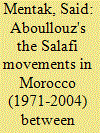

|
|
|
|
|
| Publication |
2011.
|
| Summary/Abstract |
This is a review of a recently published book on Salafiyya in Morocco. The author of the book, Abdelhakim Aboullouz, has conducted a socio-anthropological research on two Salafi movements in Marrakech. With my background knowledge of the topic, I have tried to read Aboullouz's book with a critical perspective: can Salafiyya be defined by only two movements? How far has Aboullouz been loyal to his socio-anthropological approach?
|
|
|
|
|
|
|
|
|
|
|
|
|
|
|
|
| 2 |
ID:
192279
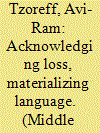

|
|
|
|
|
| Summary/Abstract |
This article focuses on Rabbi Yosef Hayyim's discussions of translation and hermeneutics, as a reflection of the broad movements between languages throughout the Ottoman Empire and the Indian Ocean, and the linguistic inequalities that characterized them. Reading Hayyim against his Baghdadi context, considering the printing and translational activities of the British missionaries of the London Society for Promoting Christianity amongst the Jews and the hermeneutics that were developed in the Baghdadi Salafiyya, I argue that Hayyim's opposition to the translation of Jewish Kabbalistic knowledge should not be seen as a conservative approach that prevents its popularization, but as an understanding of the linguistic power relations involved within the act of translation. Juxtaposed vis-à-vis his uses of Arabic translations in other responsas and his call for the teaching of standard Arabic in Jewish schools in Baghdad, that cohered with the Nahdawi perception of Arabic as a major aspect of the Ottoman Mashriq Arab political community, I argue that these incidents reflect different intersections of languages and power that occurred in the urban sphere of Ottoman Baghdad.
|
|
|
|
|
|
|
|
|
|
|
|
|
|
|
|
| 3 |
ID:
097705
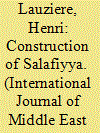

|
|
|
|
|
| Publication |
2010.
|
| Summary/Abstract |
For nearly a century of scholarship, uncertainties and paradoxes have beleaguered interpretations of the origins and meaning of Salafism (al-salafiyya). Although academics and journalists alike are well aware of the various definitions and conflicting narratives of Salafism, relieving some of the confusion that beclouds the term continues to prove difficult. Given that concepts are fluid and relational, this state of affairs may seem inevitable. Yet there are reasons to believe that the current confusion surrounding Salafism is in part attributable to faulty scholarship and that consequently the substance and history of this religious orientation will remain unnecessarily puzzling so long as the production of knowledge about Salafism goes unexamined. In that sense, recent scholarly efforts to remedy the situation by providing deeper insights into the intellectual, geographical, and political diversity of Salafism have produced mixed results, for they have largely overlooked two of the most persistent epistemological problems that are at the root of much of the present-day ambiguity.
|
|
|
|
|
|
|
|
|
|
|
|
|
|
|
|
| 4 |
ID:
134221
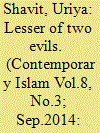

|
|
|
|
|
| Publication |
2014.
|
| Summary/Abstract |
Through an analysis that focuses on wasati and salafi fatwas, but searches also beyond them, this article demonstrates the emergence of a broad agreement (albeit not a consensus) in Islamic jurisprudence on the permissibility of political participation in the West. This broad agreement is based primarily on jurists' evaluation, drawing on 'fiqh al-muwazanat' (the jurisprudence of balances) that, in some cases, participation brings more benefit (maslaha) than harm (mafsada). The article comparatively examines wasati and salafi approaches to politics and to Muslim minorities to explain why jurists who disagreed on other fundamental issues in the field of fiqh al-aqalliyyat al-Muslima (the religious law of Muslim minorities) reached similar (but not identical) conclusions on political participation. Based on this analysis, a revision of some prevailing categorizations of salafiyya is suggested. Deliberations by some salafis, jihadi-salafis and members of Hizb al-Tahrir who oppose political participation and their refutations of the justifications invoked by jurists who legitimized it are also examined.
|
|
|
|
|
|
|
|
|
|
|
|
|
|
|
|
| 5 |
ID:
132360
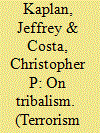

|
|
|
|
|
| Publication |
2014.
|
| Summary/Abstract |
In this article, we endeavor to shed new light on the consequences of tribalism in the present day, one of the most important of which is the threat posed by lone wolf actors and the emergence of autonomous cells that operate with no central direction. To better acquaint the reader with the theoretical models used in this article-in particular the Trinitarian model of Carl von Clausewitz-we begin with historic models dating back to Alexander the Great. The central focus of our article posits a reconceptualization of tribalism as a driving force behind the global jihadist phenomenon. We will go into the cases of Iraq and Afghanistan in some depth, believing that it is necessary to provide a close examination of these case studies to better understand the emergence of jihadist lone wolves who operate both in the ungoverned spaces of the Middle East and South Asia and in their Western homelands. We conclude with an examination of cases of jihadist lone wolf terrorism involving recent converts to radical Islam in the U.S. Finally, our article focuses on the emerging security threats posed by lone wolves, autonomous cells, and the challenges ahead for the military, security, and intelligence services.
|
|
|
|
|
|
|
|
|
|
|
|
|
|
|
|
|
|
|
|
|